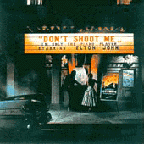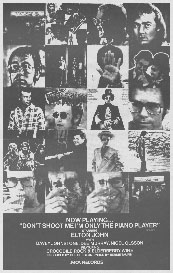![]()
  |

Don't Shoot Me I'm Only The Piano Player
Elton John
MCA 2100
Released: January 1973
Chart Peak: #1
Weeks Charted: 89
Certified Gold: 2/12/73
 Visually, musically, and in every other way, Don't Shoot Me I'm Only the Piano Player is engaging entertainment and a nice step forward in phase two of Elton John's career, the phase that began with Honky Chateau. The essence of Elton's personality, on record and in performance, has always been innocent exuberance, a quality intrinsic in most of the best rock'n'roll of the Fifties and early Sixties. Elton's only major problem after the success of his first album was finding the right direction for his talent, and until Honky the path chosen led up a blind alley. In Madman Across the Water, which closed phase one, Gus Dudgeon's overly lavish production and Bernie Taupin's often impenetrable lyrics ultimately created a barrier between Elton and his audience that severely endangered his star status. Honky Chateau was a sensational, unexpected comeback, as much a triumph of Dudgeon and Taupin's versitile professionalism as of Elton's musicality.
Visually, musically, and in every other way, Don't Shoot Me I'm Only the Piano Player is engaging entertainment and a nice step forward in phase two of Elton John's career, the phase that began with Honky Chateau. The essence of Elton's personality, on record and in performance, has always been innocent exuberance, a quality intrinsic in most of the best rock'n'roll of the Fifties and early Sixties. Elton's only major problem after the success of his first album was finding the right direction for his talent, and until Honky the path chosen led up a blind alley. In Madman Across the Water, which closed phase one, Gus Dudgeon's overly lavish production and Bernie Taupin's often impenetrable lyrics ultimately created a barrier between Elton and his audience that severely endangered his star status. Honky Chateau was a sensational, unexpected comeback, as much a triumph of Dudgeon and Taupin's versitile professionalism as of Elton's musicality.
 Click image for larger view. |
The album's most moving cut, however, is the opener, "Daniel." A gem of technical virtuosity, it has Elton doubling on electric piano and "flute" mellotron and Ken Scott on synthesizer, together making as deft use of the new electronic instrumentation as I've heard. Elton's melody and vocal are unusually tender and expressive, and Taupin's lyric, in which he recalls watching a plane carrying away his older brother, is exceptionally lovely.
If Honky Chateau established Elton John as a leading contender for the bantam-weight championship of rock & roll, Don't Shoot Me I'm Only the Piano Player should hand him the title.
- Stephen Holden, Rolling Stone, 3-15-73.
Is it only wishful thinking, or was this an abridged title? Was it originally "...I'm Not Responsible for the Lyrics"? I'm firmly convinced that the farther away Elton John gets from Bernie Taupin, the better he gets; and I'm guessing that it was John's influence that made Honky Chateau such a pleasant and satisfying album and Taupin's influence that made Madman Across the Water such a puffy bore.
Part of Elton John's talent is that he can -- or is forced to -- twist and turn to provide some kind of musical resolution of Taupin's lyrics and song characters, to prop up Taupin's bad choices in song subjects or situations. John performs nobly on "Daniel" (a follow-up to "Levon"), and he manages to do something with throwaway songs like "Teacher I Need You" and even such wildly misplaced sympathy songs for the world's ugly and unlucky as "Have Mercy on the Criminal." But what reasonable excuse is there for junk like "Texan Love Song" (about how them rednecks gonna kill them long-hair hippie commie faggie freakers who contaminate good Texan women)? This is schoolboy rebel stuff, but somehow John manages to make it passable anyway.
"Crocodile Rock," though, is a deadly accurate portrait of a fossilized rocker from the Fifties -- score one for Taupin -- and "High Flying Bird" has some nice moments. The collaboration between John and Taupin is commercially very successful, but as someone once pointed out about the Lone Ranger's exploits, you always get the feeling that if it came to a pinch Tonto could handle everything without any help. Maybe one day John will ask Taupin: "What you mean 'us,' white poet?
- Joel Vance, Stereo Review, 6/73.
Elton and Bernie Taupin's music is given a superb graphic touch in this fancy package of expanded sounds. Elton's smooth voice and gentle piano on "Blues For Baby And Me" are starkly contrasted with a soulful sax undercoating and a new rhythmic sound on "Elderberry Wine." Multi-tracking and strings provide a broad, rich, well-executed produced sound. "Crocodile Rock" is the next to last cut on side two.
- Billboard, 1973.
Dear Elton: If you're trying to claim it's all Bernie's fault, just hold on. One half of a songwriting team can always bail the other out of rock and roll as competent and (not counting that new sexist streak) unexcessive as this, as each of you proved on Honky Chateau. Maybe Bernie refuses to outgrow his pistol envy. But that's no reason for you to make the music not-with-a-bang-but-a-whimper. C+
- Robert Christgau, Christgau's Record Guide, 1981.
Far from being "only the piano player" when Don't Shoot Me was released, Elton John was already on the very brink of his "mega-stardom." The production qualities and music have advanced apace from earlier albums introducing synthesizer and mellotron behind the tight rock ensemble of Johnstone, Murray and Olsson. In addition to Paul Buckmaster's sweeping string arrangements Elton brings in a "power" brass section for songs like "Elderberry Wine" and "Teenage Idol." Many of these songs are shot through with images of the American myth that powered the 1971 album Tumbleweed Connection but here the personal content of songs is more assured. Strong though Don't Shoot Me is, it stands at a slightly uneasy crossroads between the early Taupin/John "Western" sound and the "excesses" of Goodbye Yellow Brick Road shortly to come. Everything has an easy singalong character -- a pleasant interlude between two great albums, Honky Chateau and Yellow Brick Road.
The UK-produced CD is clean and clear, but the more complex production lacks some of the vivid clarity and punch of the earlier Elton John sound.
- David Prakel, Rock 'n' Roll on Compact Disc, 1987.
The songs; e.g. "Daniel" and "Crocodile Rock" are every bit as good as those on Honky Chateau as far as the writing goes. The performance, unfortunately, is a different matter. For some reason, on this album, Elton is just going through the motions (a fact which is highlighted by the clarity the CD imposes on the vocals). Now, some would say that is all he ever does, but sometimes, he did it with more feeling than others, and this ain't one of those times. The production often sounds forced. The CD's sound is nothing to write home about, its sharp clarity being more than offset by brightness which is often excessive to the point of harshness. They ought to try this one all over again, from scratch. The material deserves it. C-
- Bill Shapiro, Rock & Roll Review: A Guide to Good Rock on CD, 1991.
The hits were the ballad "Daniel" and the nuevo-retro rocker "Crocodile Rock," but there were also such excellent album tracks as "Elderberry Wine" and "I'm Going To Be A Teenage Idol" to keep things moving. * * *
- William Ruhlmann, The All-Music Guide to Rock, 1995.
Elton John's pop sensibilities abundantly came to the fore on Don't Shoot Me, I'm Only The Piano Player in which he further sealed his status as a genuine superstar.
Recorded in June 1972 -- and like its predecessor Honky Chateau at Strawberry Studios in Chateau d'Herouville, just outside Paris -- the album salutes the artist's love of catchy, good-time rock 'n' roll, but also offers social commentary via Bernie Taupin's (John's long-time lyricist) lyrics on the likes of "Have Mercy On The Criminal" and "Texan Love Song."
Two of the album's highlights are undoubtedly its pair of singles, "Daniel" and "Crocodile Rock." The former, the set's opening track, is a heartfelt, moving ballad that stands as one of Elton John's greatest, even if its original Vietnam setting is forever lost by a decision to lose the final verse.
By contrast, "Crocodile Rock," which in February 1973 became the singer's first ever Hot 100 Number One, is an unashamed celebration of his boyhood love of rock 'n' roll. Teenage themes are also visited on "Teacher I Need You" and "I'm Going To Be A Teenage Idol."
Eight months after his first US Number One album with Honky Chateau, Don't Shoot... replaced War's The World Is A Ghetto at the top in March 1973 for a two-week run, while it also topped the UK chart.
As of 2004, Don't Shoot Me, I'm Only The Piano Player was the #85 best-selling album of the 70s.
- Hamish Champ, The 100 Best-Selling Albums of the 70s, 2004.
Don't Shoot Me is pure razzle-dazzle, or as Elton put it, "a very happy album, very ultrapop." He scored his first Number One with the sock-hop romp "Crocodile Rock," but got sentimental with tear-jerkers like "High Flying Bird" and "Daniel."
- Rob Sheffield, Rolling Stone, 3/23/17.
![]() Reader's Comments
Reader's Comments
No comments so far, be the first to comment.